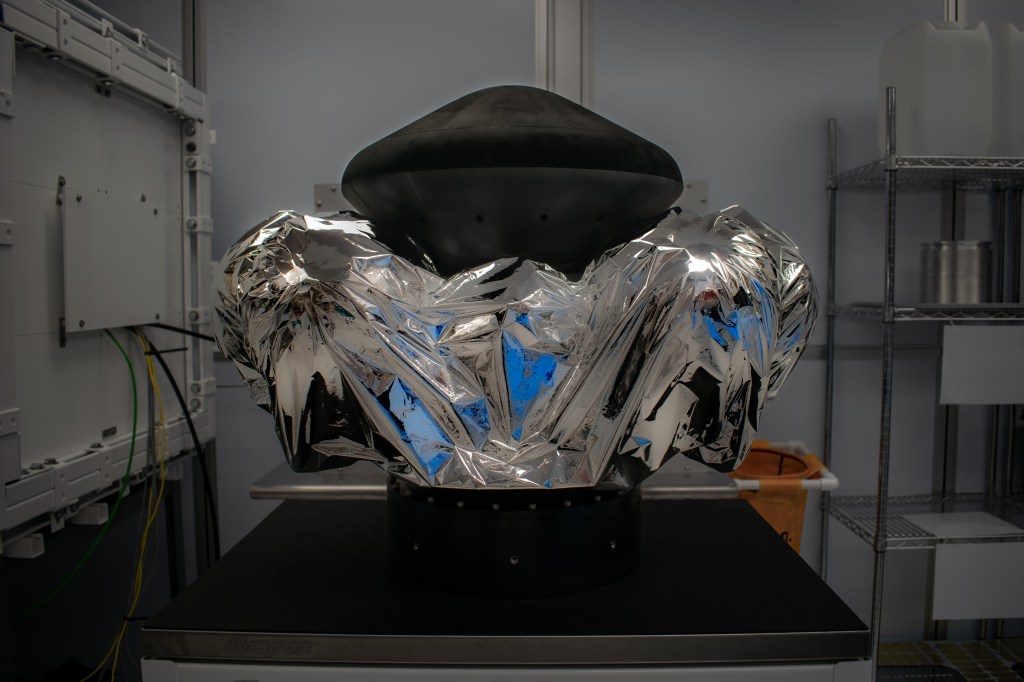Inversion Space is aptly named. The three-year-old startup’s primary concern is not getting things to space, but bringing them back — transforming the ultimate high ground into “a transportation layer for Earth.”
The company’s plan — ultra-fast, on-demand deliveries to anywhere on Earth — sounds like pie in the sky, but it’s the sort of moonshot goal that could transform terrestrial cargo transportation. The aim is to send up fleets of earth-orbiting vehicles that will be able to shoot back to Earth at Mach speeds, slow with specially-made parachutes and deliver cargo in minutes.
Inversion has developed a pathfinder vehicle, called Ray, that’s a technical precursor to a larger platform that will debut in 2026. Ray will head to space this October, on SpaceX’s Transporter-12 rideshare mission, paving the way for Inversion’s future plans on orbit (and back).
Ray is small — about twice the diameter of a standard frisbee — and will spend anywhere from one to five weeks in space, depending on factors like weather and how the orbit aligns with the landing site, Inversion CEO Justin Fiaschetti explained in a recent interview.
This first mission will have three phases: the initial on-orbit phase, where the spacecraft will power on, charge its batteries and hopefully send telemetry to the ground. During the second phase, Ray will use its onboard propulsion system to slow down the vehicle so it starts losing altitude and reentering the atmosphere. The reentry capsule will separate from the satellite bus (both designed in-house), with the latter structure burning up.
The third and final phase will see Ray slow down using a supersonic drogue parachute, from a reentry speed of Mach 1.8 to Mach 0.2. The main parachute will then deploy, further slowing the capsule to a soft splashdown off the coast of California.
Impressively, the company has designed and built almost all of the Ray vehicle in-house, from the propulsion system to the structure to the parachutes. This last component is key: Almost no space company designs parachutes themselves, and they’re incredibly challenging to engineer from the ground up. Inversion’s engineering team completed qualification testing of the deployment and parachute systems last year.
We’ve completed a successful qualification campaign of the full recovery system for Ray, our pathfinder vehicle! Both of the parachutes and their deployment systems have been developed in-house by our recovery engineers, Connor & Daniel. pic.twitter.com/mPquy1nGbE
— Inversion (@InversionSpace) September 5, 2023
Fiaschetti said strong vertical integration has helped the company move so quickly.
“The purpose of our Ray vehicle is to develop technology for our next-gen vehicle. As such, we’ve built basically the entire vehicle in-house,” Fiaschetti said. “What we saw was that if we can build in-house now, do the hard thing first, that allows us to scale very quickly and meet our customer needs.”
The reentry vehicle is totally passive — meaning it doesn’t have active controls to navigate its reentry to Earth — but the company’s larger next-gen vehicle, called Arc, will have “football field-level” accuracy.
Inversion was founded by CEO Justin Fiaschetti and CTO Austin Briggs in 2021, but the two go back further: They met when they sat next to each other at a Boston University freshman matriculation ceremony. The pair eventually got jobs in southern California — Briggs, as a propulsion development engineer at ABL Space Systems, while Fiaschetti had brief engineering stints at Relativity and SpaceX — and they were actually roommates when they first floated the idea of developing technology to deliver cargo anywhere on Earth.
The company went through Y Combinator in the summer of 2021 (it was one of our favorites from the cohort) and closed its $10 million seed round in November that same year.
“We’ve been off to the races ever since,” Fiaschetti said. The company’s grown to 25 employees, who are based out of Torrance, California, where they have a 5,000-square-foot facility. The startup also owns five acres of land in the Mojave Desert, where it conducts engine testing. The scaling of the team and this first mission have been entirely financed by that seed round.
The startup sees promising markets in both government agencies and private companies; both segments could use Inversion’s reusable platform as an on-orbit testbed, or as a delivery vehicle to a private commercial space station. Inversion is aiming on pushing both reusability and duration-on-orbit “to the maximum” to bring down costs and also to support different mission profiles, Fiaschetti said.
Inversion aims to fly the next-gen vehicle, Arc, for the first time in 2026. While the two co-founders declined to provide more details on the spacecraft, the company’s website says it will be capable of carrying more than 150 kilograms of cargo, to provide “proliferated” delivery in space.
“We are testing hardware consistently. We’re developing an infrastructure to be able to scale ourselves. Just as our decision to bring parachutes in-house was a decision because the parachutes are so directly applicable to what we’re building, it’s making those kinds of key decisions that allows us to move much faster than another reentry vehicle would take much longer to develop.”































Comment